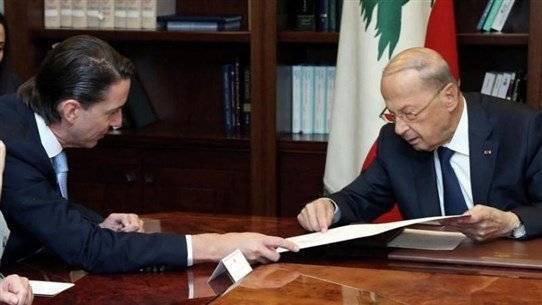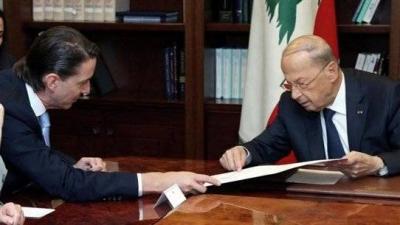A official source expected that Lebanon will receive an urgent message in the coming hours from the American mediator Amos Hochstein regarding maritime border demarcation between Lebanon and Israel. The source stated that the American ambassador in Beirut, Dorothy Shea, requested an urgent meeting to inform President Michel Aoun of the latest developments related to the Israeli response to the Lebanese demands, including the suggestion not to work on the land points concerning the delineation of the new line, which Israel wanted to claim under the pretext of having a security zone within Lebanon's territorial waters.
The official source indicated that Lebanon expects a draft agreement in a clear text that outlines its rights without ambiguity. The source clarified that Lebanon emphasized to Hochstein the necessity of not sending a draft that includes references to land points, as it would be rejected. The American mediator based his proposal on defining a security area slightly off the shore, which would then either be under the auspices of the United Nations or treated as a buffer zone between the two parties.
According to the source, Lebanon's proposal of placing the maritime security area under the supervision of the UN force was not accepted by the Israeli side. Consequently, Israel had no choice but to agree to the other proposal stating that what is being worked on is not related at all to point B1; thus, the buoy line means nothing, and matters should remain as they are, with discussions confined to line 23, which guarantees each party their respective complete blocks. The source suggested that this might be the solution unless the opponent surprises with something that could destroy everything.
Based on this, the source reported that the American side would send to Beirut what would have received Israeli approval, and therefore no one expects further negotiations. President Michel Aoun is forming a legal, technical, and administrative team that will evaluate the draft in consultation with Presidents Nabih Berri and Najib Mikati. Consultations will also take place with Hezbollah’s leadership, which is awaiting Lebanon's official stance before deciding its next steps. It was noted that Sayyed Hassan Nasrallah would speak today at a religious event in the south, amid expectations that he would address the border demarcation issue by reminding that procrastination poses threats to any settlement and that time is not open indefinitely.
According to the source, Washington, which is eager to obtain initial approval from both sides, wants to prepare the atmosphere for achieving the agreement or signing documents in a private meeting in Naqoura, attended by a representative from the United States and the United Nations, before officially announcing the completion of the agreement. In this case, Israel would immediately announce the executive steps for extracting gas from the Karish field and other fields. The French company "Total" will announce its program to launch exploration operations in the Lebanese fields in accordance with agreements in place with Lebanon’s Ministry of Energy.
In Israel, the atmosphere seems "very cautious" in recent hours. A lot has been said in the Israeli media about what is called "the path to an agreement with Lebanon," with a focus on "the shrinking timeline for a potential agreement," as the company "Energean," holding drilling rights in the Karish field, aims to start gas extraction by mid-October and is already preparing for reverse gas pumping from the coast to the platform before commencing the transfer to the shore.
Political sources have informed journalists that Hochstein is preparing "a final written proposal for both parties," after having provided his latest ideas to them verbally, and that the council of ministers is expected to meet on Thursday for the first session regarding the proposed settlement.
Israelis interpreted that "Hezbollah" has toned down its escalating rhetoric, with Hebrew reports indicating that the Secretary-General of Hezbollah, Sayyed Hassan Nasrallah, "is still threatening but to a lesser extent now," and some find in his recent positions encouraging signs of his willingness to accept a settlement if achieved. Sources involved in the negotiations reported that Israel "accepted" that "the main obstacle related to precise border demarcation remains unresolved on the same coastal line."
However, there is still an existing problem in Israel that is not present in Lebanon and relates to the opposition to Yair Lapid's government, where followers of opposition leader Benjamin Netanyahu have begun talking about organizing protests near Lapid's home in Tel Aviv. There may also later be attempts to file objections to the Supreme Court, in a weak effort to request a public referendum on the agreement.
In the same context, it seems that all parties involved in the agreement in Lebanon, Israel, the United States, and the West are concerned about the presentation aspect. Celebrations are expected in Lebanon to celebrate the significant achievement, while the United States will promote the idea of negotiations as a pathway to achieving settlements, which will be a topic of wide discussions in Israel amid election fever, especially among those who believe that Lapid has succumbed to resistance. It was notable what the well-known scholar Dr. Eddy Cohen from the Begin-Sadat Center said, noting that Lapid's government has yielded to Sayyed Nasrallah. In response to a question about whether he believes Hezbollah's Secretary-General, Dr. Cohen replied: "Yes, I believe him."




